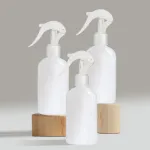Jars Or Spray Bottles? You Choose As Your Cosmetic Packaging
The world of cosmetics is not only about the formulation and efficacy of the products but also extends to the art of presentation and packaging. Cosmetic brands face the crucial decision of selecting the right packaging that complements their product, enhances user experience, and aligns with brand values. Two popular contenders in the realm of cosmetic packaging are jars and spray bottles. Each option brings unique benefits and considerations, making the choice a strategic one for cosmetic manufacturers and beauty enthusiasts alike.
Jars: Versatility and Visibility:
Jars have long been a classic choice in the cosmetic industry, appreciated for their versatility and the visual appeal they bring to the product. One significant advantage of jars lies in their ability to accommodate a wide range of cosmetic formulations. Creams, balms, and thicker products find a natural home in jars, providing users with easy access to the product with their fingers or a cosmetic spatula. The transparency of jars allows consumers to see the product inside, providing a sneak peek into the color, texture, and quality of the cosmetic.
However, the use of jars comes with its set of considerations. Hygiene is a critical factor, as users typically need to dip their fingers or tools into the product. This continuous contact increases the risk of bacterial contamination over time. Additionally, certain formulations may be sensitive to air exposure, potentially leading to oxidation and degradation of active ingredients. Cosmetic manufacturers must weigh these factors against the benefits of visibility and accessibility when opting for jar packaging.

Spray Bottles: Precision and Hygiene:
On the other side of the cosmetic packaging spectrum, spray bottles offer precision application and a heightened level of hygiene. These bottles are ideal for liquid formulations such as facial mists, setting sprays, and hair spritz. The spray mechanism ensures controlled and even distribution of the product, enhancing the user experience and preventing overuse. This precise application is particularly valuable for products where dosage control is crucial.
The hygiene factor is a standout feature of spray bottles. Unlike jars, users do not have direct contact with the product, reducing the risk of contamination. This can be a significant selling point for consumers who prioritize cleanliness in their beauty routines. Furthermore, spray bottles often come with airtight seals, minimizing exposure to air and preserving the freshness and efficacy of the cosmetic formulation.
However, spray bottles also have their limitations. They are best suited for liquid or lightweight formulations, and thicker creams may pose challenges in effective dispensing. Additionally, if the cosmetic product is opaque or contains particulates, the spray bottle may not showcase its features as effectively as a transparent jar.
Choosing the Right Fit for Your Brand:
The decision between jars and spray bottles is not a one-size-fits-all scenario. Cosmetic brands must carefully evaluate their product formulations, target audience preferences, and brand positioning before selecting the appropriate packaging. Some brands even adopt a diversified approach, offering both packaging options within their product line to cater to a broader range of consumer needs.
For brands emphasizing luxury and a spa-like experience, jars may be the preferred choice, allowing users to indulge in a sensory and tactile application. In contrast, brands targeting convenience and on-the-go lifestyles may find that spray bottles align more closely with their ethos, providing users with a mess-free and portable application.
Conclusion:
In the dynamic world of cosmetics, packaging is an integral part of the overall brand narrative. Cosmetic Jars and spray bottles each bring their unique advantages and considerations to the table, requiring careful consideration by cosmetic manufacturers. The choice between these two packaging options ultimately depends on factors such as the nature of the cosmetic product, user preferences, and the brand's overarching strategy. By understanding the strengths and limitations of jars and spray bottles, brands can make informed decisions that not only protect the integrity of their formulations but also enhance the overall beauty experience for consumers.

